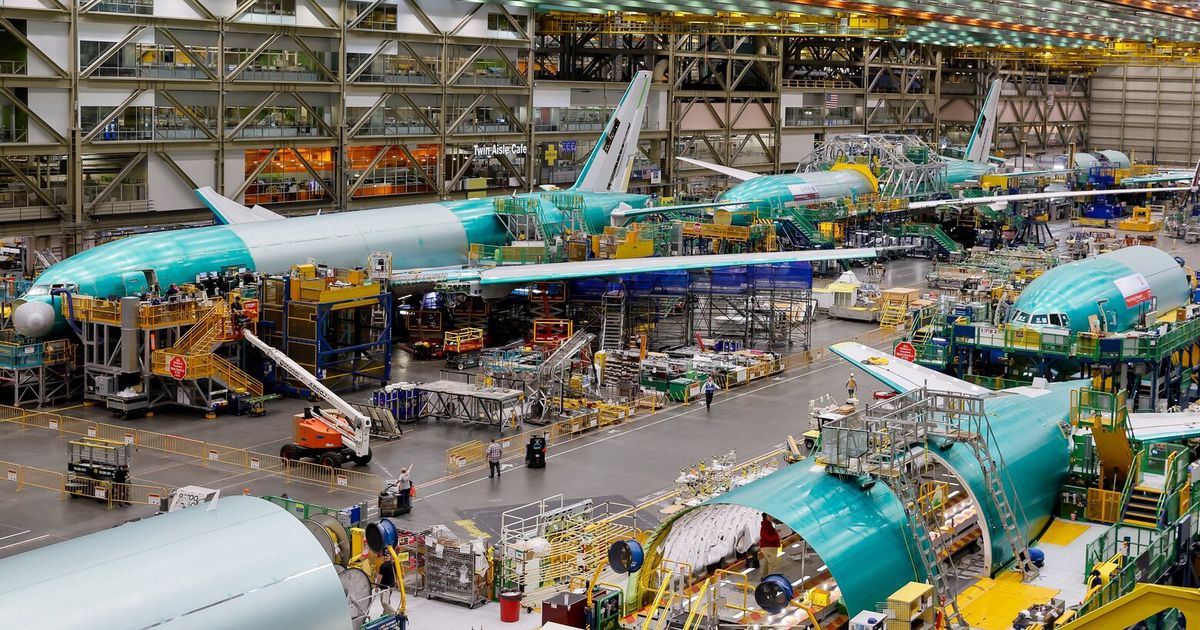Minuto 1:28
Ecco, magari non avrei tirato fuori con quell'enfasi la parola "quality"...
Minuto 1:28
Buona notizia per il 777 e le aviolinee che lo attendono, ma dubito che un anno sia sufficiente: le risorse della FAA sono ancora poche (dopo anni trascorsi lasciando che Boeing autocertificasse, mi sa che vorrà ancora tempo prima che si ricostituisca una forza lavoro adeguata all'adempimento dei reali compiti dell'ente), gli ispettori che ci sono avranno paura di firmare qualsiasi cosa, Boeing (viziata da anni di autocertificazione) non sa più come portare avanti un processo di certificazione oggettivo, e di politici disposti a rischiare per dare spintarelle ce ne saranno pochi. Anima in pace: secondo me si va a fine 2025 o 2026 per le prime consegne. Speriamo bene.Alfin giunse la Type Inspection Authorisation; in base ad aerei precedenti, la certificazione da parte della FAA dovrebbe richiedere un annetto.
x.com
x.com
Arriverà assieme al 350F. Bella lotta.Buona notizia per il 777 e le aviolinee che lo attendono, ma dubito che un anno sia sufficiente: le risorse della FAA sono ancora poche (dopo anni trascorsi lasciando che Boeing autocertificasse, mi sa che vorrà ancora tempo prima che si ricostituisca una forza lavoro adeguata all'adempimento dei reali compiti dell'ente), gli ispettori che ci sono avranno paura di firmare qualsiasi cosa, Boeing (viziata da anni di autocertificazione) non sa più come portare avanti un processo di certificazione oggettivo, e di politici disposti a rischiare per dare spintarelle ce ne saranno pochi. Anima in pace: secondo me si va a fine 2025 o 2026 per le prime consegne. Speriamo bene.
Beh, il precedente era per il 787 che era non solo completamente nuovo di trinca, ma aveva anche soluzioni nuove e mai viste (full electric, bleedless).Buona notizia per il 777 e le aviolinee che lo attendono, ma dubito che un anno sia sufficiente: le risorse della FAA sono ancora poche (dopo anni trascorsi lasciando che Boeing autocertificasse, mi sa che vorrà ancora tempo prima che si ricostituisca una forza lavoro adeguata all'adempimento dei reali compiti dell'ente), gli ispettori che ci sono avranno paura di firmare qualsiasi cosa, Boeing (viziata da anni di autocertificazione) non sa più come portare avanti un processo di certificazione oggettivo, e di politici disposti a rischiare per dare spintarelle ce ne saranno pochi. Anima in pace: secondo me si va a fine 2025 o 2026 per le prime consegne. Speriamo bene.

1) Traveled work is still a big thing, in spite of the much reduced output
Though the production rate of 777 jets is at a crawl, with a total of just 11 deliveries so far this year, employees describe a chaotic workplace.
Mechanics are chasing airplanes through the Everett factory to install systems that should have gone in earlier and to complete rework of defects on 777 cargo planes that have traveled far down the assembly line and even outside onto the Paine Field flight line
Boeing personnel conducting inspections out on the airfield flight line are finding multiple structure, systems and interior defects that were missed inside the factory.
“Things have gotten worse, not better. It’s embarrassing,”
2) Difficulty building the 777 fuselage (an old issue never fixed apparently)
This work of stitching together the fuselage has been problematic since 2016 when Boeing introduced a new way of holding the panels in place.
Engineers had designed that new assembly system to use riveting robots that ultimately proved incapable of the necessary precision.
Boeing finally gave up and abandoned the robots in 2019. Ever since, mechanics have built the fuselages by hand.
Without the fixtures that held the panels in place in the old way of building the 777, however, the panels are very difficult for mechanics to align properly.
So for every fuselage built, engineers use lasers to measure the misalignments between skin panels and the force needed to make them flush with one another, feeding the data to stress engineers.
This painstaking process has added two to three days to what is supposed to be a five-day build
3) Supply chain delays contributing to the traveled work
Outside on the flight line, mechanics are currently installing some basic wiring and electrical components in 777 freighters, said a systems installer who has worked on 777s for more than 5 years.
The electrical wiring is the nervous system, or the guts, of the airplane, typically the first system installed when the fuselage enters the main assembly building, before the wings are attached. It’s vastly out of sequence to be doing this on the flight line.
Boeing said in a statement that “we continue to face supply constraints across our factories, which drives rework and traveled work. Traveled work is a reality for any manufacturing system.”
4) The assembly line is now also a disassembly line!
Another aspect of the out-of-sequence work, according to the systems installer, is that due to supply chain shortages some parts had to be taken from other planes inside the factory and put on 777s close to delivery.
Mechanics sometimes have even cannibalized the completed 777-9Xs in long-term storage on Paine Field.
5) The cherry on the pie: a complete loss of aircraft as-built configuration!
A mechanic whose job is to take care of those 777-9Xs to make sure the systems don’t deteriorate in storage said parts have been removed several times without any notice to his team or documentation of the removal — a serious breach of Federal Aviation Administration regulations.
In light of this allegation, Boeing said it is “reviewing our documents and airplanes in storage to ensure accuracy in our record keeping.”
“Every employee who becomes aware of an undocumented removal has an obligation to report it. We ask that anyone with knowledge of this should provide detailed information through our ‘Speak Up’ system.”

E gli dice comunque bene, visto che il KC-46 ha un backlog di circa 90 macchine ancora da consegnare solo all'USAF (su 180 ordinati).Leggo nel link postato sopra (Media Room) che, una volta prodotti gli esemplari ancora in ordine, verrà chiusa la catena del 767F. Del 767 rimarrà in produzione solo la versione tanker.

Emirates ha già ordinato qualche A350 e, cosa ancor più importante, ha già ricevuto simulatori e allestito buona parte dell'organizzazione e degli strumenti per il training degli equipaggi. Siccome ha 200 (o giù di lì) 777X in ordine (per consegnare i quali ci vorrano almeno 10 anni), nonché una marea di piloti Airbus più facili da convertire al 350 che al 777, ha ampio margine di manovra: a questo punto potrebbe tranquillamente annullare almeno 50 ordini e sostituirli con A350-1000 da consegnare fra 6 anni. Probabilmente questo non accadrà, ma la "serious conversation" con Boeing comporterà un ulteriore sconticino: da capire, poi, il ruolo di General Electric: i 777 sono a motorizzazione esclusiva GE, i 350 sono esclusiva RR. Mi chiedo se Emirates vada a battere cassa anche da GE per non cancellare ordini. Andrà a finire che Boeing venderà 200 777X a Emirates in perdita pesante per evitare di offendere Emirates e GE.
Emirates to hold 'serious conversation' with Boeing over 777X plane delays, Tim Clark says | The National
US plane maker has said it will delay the debut of its 777X until 2026, having previously planned to deliver the aircraft in 2025www.thenationalnews.com
Emirates non l'ha presa benissimo, sospetto però che non abbia alcun margine di manovra nei confronti di Boeing. Non esistono concorrenti diretti del 777x ed un eventuale adozione dell'A350 comporterebbe mettersi in coda alla lista d'attesa.
Speriamo non a scapito della sicurezzaAndrà a finire che Boeing venderà 200 777X a Emirates in perdita pesante per evitare di offendere Emirates e GE.
Piu' che evitare di offendere penso sara' un evitare di pagare danni/penali/ecc.Andrà a finire che Boeing venderà 200 777X a Emirates in perdita pesante per evitare di offendere Emirates e GE.

 theaircurrent.com
theaircurrent.com
Boeing ha la grande fortuna che le compagnie sono con il cappio al collo. Airbus non può certo raddoppiare la capacità produttiva in pochi anni e ha già anni di produzione prenotata.Nessuna delle prime 10 compagnie che ha ordinato il 77X cancellerá, secondo me. I lavori di readiness (e sono tanti, dai simulatori ai milioni per modificare hangar e quant’altro) sono giá in fieri, e non conviene fermarli. Boeing pagherà milioni di penali, inclusi C e D checks per aerei che altrimenti verrebbero dismessi. Un tempo avrebbe anche offerto altri mezzi in leasing (per BA avevano dato dei 77W a causa del ritardo dei 787) ma ora non penso che abbiamo altro da offrire.
Anche in Airbus però le cose non vanno bene, col disastro che è Rolls Royce…
